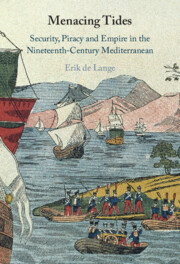Refine search
Actions for selected content:
68 results
6 - Confronting Revolution
- from Part III - Courts for a New Empire, 1816–1825
-
- Book:
- The Nation at Sea
- Published online:
- 28 August 2025
- Print publication:
- 11 September 2025, pp 191-227
-
- Chapter
- Export citation
7 - Policing the High Seas
- from Part III - Courts for a New Empire, 1816–1825
-
- Book:
- The Nation at Sea
- Published online:
- 28 August 2025
- Print publication:
- 11 September 2025, pp 228-265
-
- Chapter
- Export citation
24 - European sea power and the origins of European domination, 1800–1850
-
-
- Book:
- The Cambridge History of War
- Published online:
- 18 July 2025
- Print publication:
- 14 August 2025, pp 573-601
-
- Chapter
- Export citation
21 - The maintenance of Hispanic dominance in Latin America
-
-
- Book:
- The Cambridge History of War
- Published online:
- 18 July 2025
- Print publication:
- 14 August 2025, pp 513-529
-
- Chapter
- Export citation
5 - Founding Alsatia
-
- Book:
- Extradition and Empire
- Published online:
- 10 September 2025
- Print publication:
- 03 July 2025, pp 150-184
-
- Chapter
- Export citation
3 - Navigating Disorder
-
- Book:
- Extradition and Empire
- Published online:
- 10 September 2025
- Print publication:
- 03 July 2025, pp 84-115
-
- Chapter
- Export citation
6 - The Law of Maritime Warfare during the Transition between Medieval and Early Modern Europe
- from Part I - International Law in Renaissance Europe (1492–1660)
-
-
- Book:
- The Cambridge History of International Law
- Published online:
- 22 April 2025
- Print publication:
- 08 May 2025, pp 204-231
-
- Chapter
- Export citation
17 - Maritime Warfare in Old Regime Europe
- from Part II - International Law in Old Regime Europe (1660–1775)
-
-
- Book:
- The Cambridge History of International Law
- Published online:
- 22 April 2025
- Print publication:
- 08 May 2025, pp 551-587
-
- Chapter
- Export citation
A Tolerated Terror: Rahmah bin Jabir and the Age of Revolutions in the Gulf, 1760-1830
-
- Journal:
- Itinerario / Volume 49 / Issue 1 / April 2025
- Published online by Cambridge University Press:
- 24 February 2025, pp. 99-113
-
- Article
-
- You have access
- Open access
- HTML
- Export citation
Chapter 3 - Ownership and Permanence
-
- Book:
- E-books and ‘Real Books’
- Published online:
- 07 December 2024
- Print publication:
- 23 January 2025, pp 61-92
-
- Chapter
-
- You have access
- Open access
- HTML
- Export citation
Chapter 2 - Pansies, Queens, Midwives
- from Part I - Plants
-
- Book:
- Botanical Culture and Popular Belief in Shakespeare's England
- Published online:
- 02 January 2025
- Print publication:
- 09 January 2025, pp 58-102
-
- Chapter
- Export citation
‘Pirates’, ports, politics: The Gulf (khalīj) & international society’s expansion
-
- Journal:
- Review of International Studies , First View
- Published online by Cambridge University Press:
- 18 October 2024, pp. 1-21
-
- Article
-
- You have access
- Open access
- HTML
- Export citation
3 - ‘To Give Law to the World’
-
- Book:
- Menacing Tides
- Published online:
- 11 April 2024
- Print publication:
- 18 April 2024, pp 108-166
-
- Chapter
- Export citation
Conclusion
-
- Book:
- Menacing Tides
- Published online:
- 11 April 2024
- Print publication:
- 18 April 2024, pp 293-307
-
- Chapter
- Export citation
2 - Opening Fire
-
- Book:
- Menacing Tides
- Published online:
- 11 April 2024
- Print publication:
- 18 April 2024, pp 56-107
-
- Chapter
- Export citation
4 - ‘No Security, Except in Destruction’
-
- Book:
- Menacing Tides
- Published online:
- 11 April 2024
- Print publication:
- 18 April 2024, pp 167-239
-
- Chapter
- Export citation
1 - Of Knights and Pirates
-
- Book:
- Menacing Tides
- Published online:
- 11 April 2024
- Print publication:
- 18 April 2024, pp 25-55
-
- Chapter
- Export citation
5 - Beyond the Littoral
-
- Book:
- Menacing Tides
- Published online:
- 11 April 2024
- Print publication:
- 18 April 2024, pp 240-292
-
- Chapter
- Export citation
Introduction
-
- Book:
- Menacing Tides
- Published online:
- 11 April 2024
- Print publication:
- 18 April 2024, pp 1-24
-
- Chapter
-
- You have access
- HTML
- Export citation

Menacing Tides
- Security, Piracy and Empire in the Nineteenth-Century Mediterranean
-
- Published online:
- 11 April 2024
- Print publication:
- 18 April 2024
